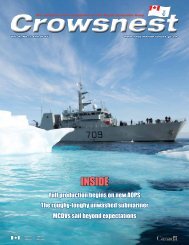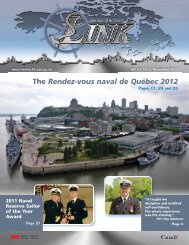You also want an ePaper? Increase the reach of your titles
YUMPU automatically turns print PDFs into web optimized ePapers that Google loves.
<strong>The</strong>re is, moreover, a major security concern attached to <strong>the</strong> proliferation <strong>of</strong> FOC. Some small<br />
countries have allowed ships to be registered anonymously with <strong>the</strong> result that anything can be<br />
transported, facilitating <strong>the</strong> efforts <strong>of</strong> criminals <strong>and</strong> terrorists to take advantage <strong>of</strong> <strong>the</strong> freedom <strong>of</strong><br />
<strong>the</strong> ocean commons. For example, <strong>the</strong>re is speculation that al Qaeda <strong>and</strong> <strong>the</strong> Taliban used such<br />
vessels to smuggle heroin <strong>and</strong> hashish from Afghanistan; <strong>the</strong> funds that were raised were being<br />
used to support <strong>the</strong>ir global activities. 134 Despite a heightened awareness <strong>of</strong> risk, some maritime<br />
countries remain opposed to greater coastal state regulation <strong>of</strong> <strong>the</strong> ocean commons. Barring a<br />
paradigm changing event, effective regulation <strong>of</strong> FOC will continue to clash with a legitimate<br />
desire by governments to exp<strong>and</strong> trading opportunities.<br />
3.5 Organized Crime <strong>and</strong> Piracy<br />
Trans-national criminal networks <strong>and</strong> terrorists are increasingly capitalising on <strong>the</strong> freedom <strong>of</strong> <strong>the</strong><br />
ocean commons. Separately, each poses significant challenges to <strong>the</strong> maritime security interests<br />
<strong>of</strong> almost all coastal states. Loss <strong>of</strong> customs revenue, control over immigration (through human<br />
smuggling), <strong>and</strong> <strong>the</strong> illegal drug trade, directly threaten <strong>the</strong> ability <strong>of</strong> some governments to<br />
maintain order within <strong>the</strong>ir borders. When such groups combine <strong>the</strong>ir efforts, <strong>the</strong> challenge that<br />
governments face is exponentially increased.<br />
For terrorist groups (including those that are state-sponsored), shipping can be a principal means<br />
by which <strong>the</strong>y obtain arms <strong>and</strong> o<strong>the</strong>r supplies. Despite a UN arms embargo on Iran, Tehran<br />
regularly uses maritime means to transport weapons, including missiles, to its main proxy in<br />
<strong>the</strong> Middle East (Hezbollah) <strong>and</strong> <strong>the</strong>reby contributes to <strong>the</strong> region’s general instability. 135<br />
North Korea does much <strong>the</strong> same with <strong>the</strong> Gaza-based Hamas. 136 Accessibility to targets in<br />
foreign l<strong>and</strong>s via <strong>the</strong> sea is a fur<strong>the</strong>r vulnerability that terrorists have proven willing to exploit.<br />
<strong>The</strong> attacks on Mumbai (2008) <strong>and</strong> <strong>the</strong> failed attempts by Hamas to penetrate Israel by sea in<br />
mid-2014 are two such instances. 137<br />
Alongside <strong>the</strong> use <strong>of</strong> <strong>the</strong> maritime sphere to facilitate terrorist attacks, <strong>the</strong>re is evidence <strong>of</strong> ties<br />
between terrorists <strong>and</strong> organized crime that rely on use <strong>of</strong> maritime transport. Working toge<strong>the</strong>r,<br />
<strong>the</strong>y have created a network for <strong>the</strong> movement by sea <strong>of</strong> illegal immigrants <strong>and</strong> for illicit trading<br />
that provides income <strong>and</strong> weapons for some jihadist groups. 138 Jihadist organizations, such as<br />
al Qaeda <strong>and</strong> <strong>the</strong> Islamic State (IS), are believed to be interested in maritime targets. A leaked<br />
134 See Frank Shanty, <strong>The</strong> Nexus: International Terrorism <strong>and</strong> Drug Trafficking from Afghanistan (Praeger:<br />
New York, 2011), p. 186, fn 55, Benjamin Weiser, “Manhattan Jury Convicts Man Linked to Taliban<br />
Leader in Drug Smuggling Case,” New York Times, 23 September 2008, “Drug money sustains al Qaeda”,<br />
<strong>The</strong> Washington Times, 29 December 2003, <strong>and</strong> Gretchen Peters, How Opium Pr<strong>of</strong>its <strong>the</strong> Taliban (US<br />
Institute <strong>of</strong> Peace: Washington, D.C., 2009).<br />
135 Guy Taylor <strong>and</strong> Maggie Ybarra, “Despite sanctions relief, Iran aids Hamas with missile technology”,<br />
<strong>The</strong> Washington Times, 18 August 2014.<br />
136 Victor Cha <strong>and</strong> Gabriel Sheinmann, “North Korea’s Hamas Connection: ‘Below’ <strong>the</strong> Surface?”, <strong>The</strong><br />
National Interest (online) , 4 September 2014.<br />
137 See Alan Cummings, “<strong>The</strong> Mumbai Attack: Terrorism from <strong>the</strong> Sea”, Centre for International <strong>Maritime</strong><br />
Security online blog, 29 July 2014 [accessed on 8 September 2014 at http://cimsec.org/mumbai-attackterrorism-sea/12280]<br />
<strong>and</strong> “Hamas terrorists killed by IDF on Israel’s Zikim beach”, Reuters, 9 July 2014.<br />
138 See Richardson, A Time Bomb for Global Trade, p. 58 <strong>and</strong> 86 <strong>and</strong> Angela Veng Mei Leong, <strong>The</strong><br />
Disruption <strong>of</strong> International Organised Crime: An Analysis <strong>of</strong> Legal <strong>and</strong> Non-Legal Strategies (Ashgate:<br />
London, 2013), pp. 22–23.<br />
DRDC-RDDC-2016-R085 29




